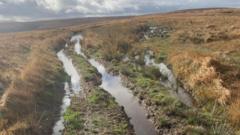Should We Ban Vehicles on Our Historic Byway?

Motorised Vehicles and Monks Trod: The Battle for an Ancient Byway
The historic Monks Trod, a byway that has served as a vital link between two ancient Cistercian abbeys, is at the center of a heated debate surrounding the use of motorised vehicles. The Cambrian Mountains Society (CMS) has raised alarms about the potential damage that increased motorised traffic, particularly from off-road motorcyclists, could inflict on this ancient route. With plans for upgrades by Powys County Council, the future of Monks Trod hangs in the balance, as stakeholders weigh the importance of preserving its historical integrity against the need for public access.
As we delve into the complexities of this issue, we’ll explore the historical significance of Monks Trod, the ecological concerns surrounding motorised vehicle use, and the perspectives of various community stakeholders. This article aims to provide a comprehensive understanding of the ongoing discussions and the implications for both the environment and local culture.
The Historical Significance of Monks Trod
Monks Trod is not just an ordinary path; it’s steeped in history. Established in the 12th century, this ancient byway was designed to connect two significant Cistercian abbeys: Abbeycwmhir and Strata Florida. The route spans almost six miles (10 km) through the beautiful and rugged landscape of Powys, eventually transitioning into an unclassified road in Ceredigion.
Historically, Monks Trod served as a crucial pathway for monks and pilgrims, providing access to religious sites and facilitating trade and communication between communities. Its enduring presence has made it a vital part of local cultural heritage, earning it recognition as a byway open to all traffic.
Understanding the Byway's Current Status
As a byway open to all traffic, Monks Trod permits access for pedestrians, horseback riders, and motorised vehicles. However, the area has faced significant challenges due to the impact of off-road vehicles, particularly 4x4s and motorcycles. In response to environmental concerns, Powys County Council has implemented a permanent ban on 4x4 vehicles and temporary restrictions on motorbikes. These measures aim to protect the integrity of the route while allowing for responsible access.
Ecological Impact of Motorised Vehicles
The ecological ramifications of allowing motorised vehicles on Monks Trod cannot be overstated. The area surrounding the byway is classified as a Site of Special Scientific Interest (SSSI) and is part of a national nature reserve. This designation is a testament to the ecological richness of the region, which includes delicate habitats and a variety of wildlife.
Wildlife Disturbance and Habitat Damage
Natural Resources Wales (NRW) has voiced concerns about the potential disturbances caused by motorised vehicles. Wildlife in the area, including various species of flora and fauna, could be significantly affected by the noise, movement, and physical damage associated with motorcycle use. This could lead to:
- Disruption of breeding cycles: Many species rely on undisturbed habitats for reproduction and nesting.
- Soil erosion: The heavy use of motorised vehicles can lead to soil compaction and erosion, ultimately damaging the landscape.
- Altered plant communities: Disturbances can change the composition of plant life, affecting the entire ecosystem.
Given these potential impacts, the argument for banning motorised vehicles on Monks Trod gains weight among conservationists and community members who prioritize ecological preservation.
Community Perspectives and Stakeholder Opinions
The debate over Monks Trod's future is not solely about preserving the environment; it also involves the voices of local community members, conservationists, and recreational users. Each group brings unique perspectives to the table, reflecting the complexity of managing shared spaces.
The Cambrian Mountains Society (CMS)
The CMS has been vocal about the need for a permanent ban on motorised vehicles on Monks Trod. Alun Davies, a member of the CMS, highlighted his concerns after walking the route and noticing its degradation due to off-road vehicle use. He noted:
“I'm all for making Monks Trod better than it is, in a limited way. But the problem with off-road motorcyclists is, as we can see, they just prefer to go off road. So if Powys County Council spent millions to resurface it, the guys will just go around it.”
This sentiment reflects a broader concern among conservationists that any upgrades made to the byway could inadvertently encourage more motorised traffic, further exacerbating the damage.
Local Farmers and Landowners
Local farmers, such as Sorcha Lewis, express similar worries. With farming interests located near Monks Trod, they are keenly aware of the potential impacts of increased motorbike traffic on the surrounding landscape and wildlife. Lewis commented:
“There are times in the summer where I'm looking for water voles or something at one end, and I'll see scrambling vehicles coming up and across the Trod and into the wider landscape.”
This observation emphasizes the interconnectedness of agricultural practices and environmental health, as disturbances from motorised traffic could threaten the delicate balance of the local ecosystem.
The Green Lane Association
In contrast, the Green Lane Association advocates for inclusive access to the countryside, supporting the responsible use of motorised vehicles alongside walkers and cyclists. Tristan Craddock from the association stated that they appreciate Powys County Council's plans to improve Monks Trod, arguing that it would enhance access for various users while condemning illegal motorised use. Craddock believes that responsible users can help monitor and report unlawful behavior, highlighting a different approach to managing shared spaces.
The Role of Powys County Council
Powys County Council finds itself in a challenging position, tasked with balancing the needs of diverse user groups while prioritizing environmental conservation. Councillor Jackie Charlton, responsible for rights of way, emphasized the importance of repairing Monks Trod for biodiversity while making it accessible to all types of users.
Charlton noted, “We want to see the Trod used by responsible walkers, responsible cyclists, responsible horse riders. People who look at the countryside in a responsible way.” However, her acknowledgment of motorcyclists as part of the user base raises concerns among environmental advocates who worry about the potential for increased damage.
Plans for Improvement
The council's proposed improvements include the creation of a dry-stone causeway intended to protect the byway and prevent further degradation. While this development aims to enhance usability for pedestrians and cyclists, it also raises questions about how it will impact motorised vehicle access.
Despite the positive intentions behind these plans, the CMS and other conservationists remain skeptical. They argue that without a permanent ban on motorised vehicles, any improvements made could be undermined by increased traffic and associated damage.
Conclusion: The Path Forward for Monks Trod
The future of Monks Trod hangs in a delicate balance. As a historical and ecological treasure, it represents a link to the past and a habitat that must be preserved for future generations. The ongoing debate regarding motorised vehicle access encapsulates broader themes of conservation, community interests, and responsible use of shared spaces.
With various stakeholders advocating for different outcomes, the challenge lies in finding common ground that prioritizes ecological integrity while still allowing for public access. As plans for improvement are considered, the voices of conservationists, local landowners, and recreational users must be taken into account to ensure that Monks Trod remains a cherished part of Wales' natural and cultural heritage.
FAQs
What is Monks Trod, and why is it significant?
Monks Trod is an ancient byway that connects two Cistercian abbeys in Wales, serving as a historical route for monks and pilgrims. Its significance lies in its cultural heritage and ecological value as part of a Site of Special Scientific Interest.
What are the current restrictions on motorised vehicles on Monks Trod?
Currently, there is a permanent ban on 4x4 vehicles, while there is a temporary restriction on motorbikes. The council is planning improvements to the byway, which raises concerns about the potential for increased motorised traffic.
Why do conservationists oppose motorised vehicle use on Monks Trod?
Conservationists are concerned that motorised vehicles can disturb wildlife, cause habitat damage, and lead to soil erosion. They advocate for a permanent ban to protect the ecological integrity of the area.
What improvements are being proposed for Monks Trod?
Powys County Council plans to create a dry-stone causeway on Monks Trod to enhance usability and reduce damage. However, there are concerns about how these improvements could impact motorised vehicle access.
How can the community balance access and conservation on Monks Trod?
Finding a balance requires dialogue among stakeholders, including conservationists, local landowners, and recreational users. It involves implementing responsible usage guidelines and potential restrictions to protect the environment while allowing public access.
As discussions continue, how do you think communities can best preserve their historical and ecological treasures while accommodating modern recreational needs? #MonksTrod #Conservation #WalesNature
Published: 2025-06-22 08:07:06 | Category: wales



